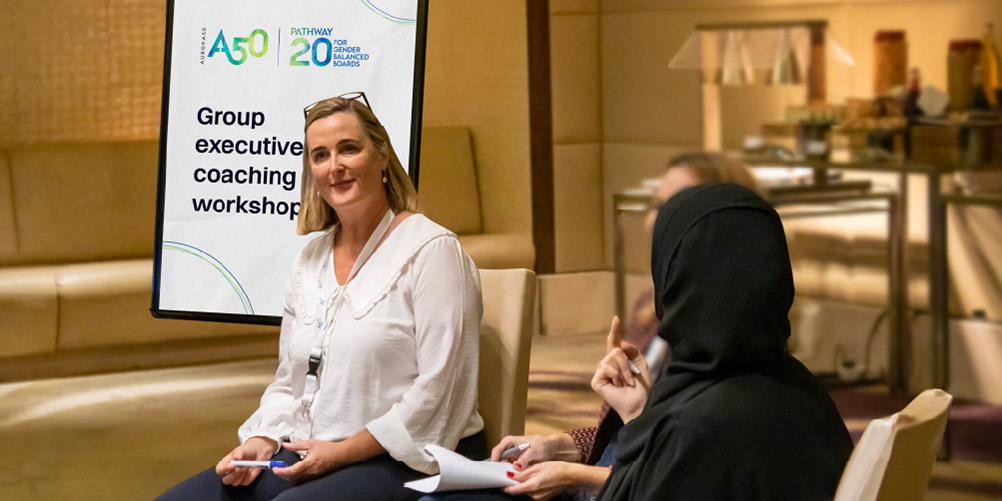






Hilary Rowe, Aurora50 coaching partner, in a Pathway workshop
Particularly in this region, ‘presenting positive’ can be an issue for women. They smile and do not admit to any struggles.
Hilary Rowe, Aurora50 coaching partner
But there are ways to counter it – either by yourself or by helping someone else as their manager, leader or as a fellow board member:
Remember successes: Tracking success for yourself or others is hugely useful. It reminds those suffering from imposter syndrome why they are qualified for the role they’re in.
Distinguish humility from fear: It’s one thing to be humble (and that’s a good thing). It’s quite another to withdraw altogether from work, because you fear being found out. You have to become self-aware enough to work the difference out.
Acknowledgement: Accept that imposter syndrome can crop up, just like any other self-doubt or inner self-talk (which we all have). Don’t waste energy on it or let it become self-destructive. Just say to yourself, “Oh yes, I remember you. You’re here because I should be here. I should be effective in this position.”
Don’t let it hold you back: Yes, you may suffer imposter syndrome but you should continue to say “yes” to opportunities. Get stuck in, and learn through the process.
Talk it out: Talk to a mentor, a coach, your manager. This is a good coping mechanism, to explore where imposter syndrome is coming from and how to manage it.
Know you’re not alone: You are probably with someone else suffering imposter syndrome in any meeting. Women think men don’t have this issue, but I’ve coached lots of men waiting to be ‘found out’ too. They don’t think they should be in a CEO or CFO position – and they’re waiting to be pranked. Yes, that goes for board directors too.

Hilary Rowe, Aurora50 coaching partner
Women think men don’t have this issue, but I’ve coached lots of men waiting to be ‘found out’ too. They don’t think they should be in a CEO or CFO position – and they’re waiting to be pranked.
Hilary Rowe, Aurora50 coaching partner
Aurora50 also covers imposter syndrome in its workshops, that form part of organisations’ diversity, equity and inclusion (DEI) strategies.
We raise awareness about the impact of imposter syndrome on the business. This can include creating a reactive culture and affecting retention.
This helps teams identify potential triggers within their own working environment. And managers learn how to identify the signs and how to tackle imposter syndrome.
[Do you have imposter syndrome in your business? Talk to us about ways to tackle it.]
If you spot someone in a meeting being quieter than other participants – not contributing to the discussion although they are clearly a subject matter expert – they are probably feeling like an imposter.
Reach out, have an offline discussion, talk about their contribution and effectiveness, and how they’re benefiting the group.
At the end of this coaching session, one participant said, “This module gave me a safe place to take an inwards look at my leadership capability.” Powerful feedback.
Hilary Rowe is an Aurora50 coaching partner. She is an accredited leadership coach and trained Hogan Assessor, with an MSc in executive coaching and a BSc in psychology. Ms Rowe lives and works in Abu Dhabi and has served on boards herself. She has over 25 years of HR and change management experience. Ms Rowe formerly led the global learning and development team at Barclays Bank, then became director of HR for a leading Gulf financial institution. She led the organisational change and transformation within Exxon Mobil’s joint venture with Qatar Petroleum.

From growing confidence and communication skills to big-picture thinking, here are 14 ways that taking a board seat at your company in the UAE will help you in your day job too.

Aurora50 co-founder Diana Wilde reflects on the year, from widening our remit to all DEI to COP 27 and the SDG 5 pledge.

The women of Ras Al Khaimah have a new venue to network in the RAK Women’s Empowerment Conference – and are being advised to become skilled networkers.


